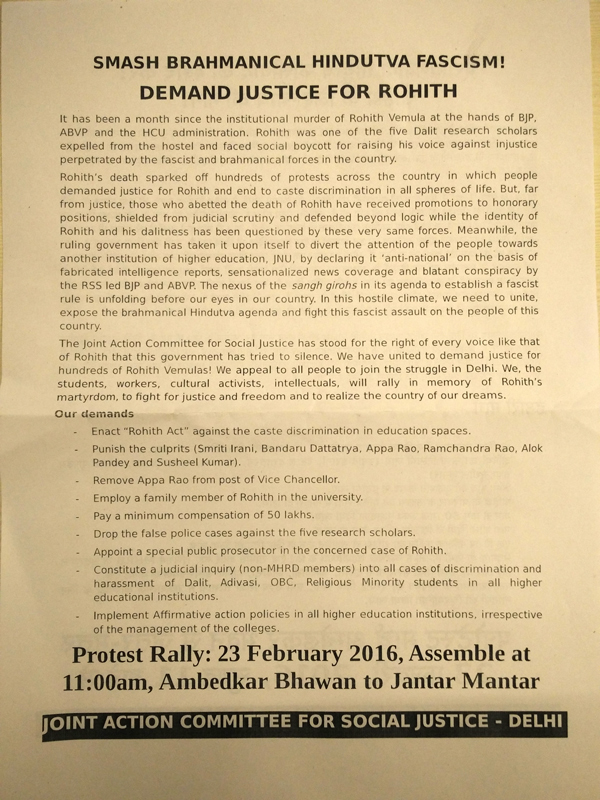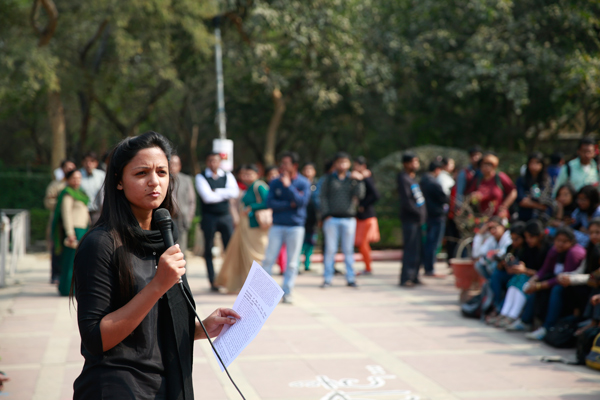#JusticeForRohith joins #FreeKanhaiya but fissures emerge among the 5 accused

The march
- JNU students and \'Justice for Rohith Vemula\' protestors are conducting a march in Rohith\'s name in Delhi
- Students have come from across India for the march, which begins from Ambedkar Bhavan
The differences
- 5 accused in the sedition case are pursuing different legal strategies
- Umar Khalid and Anirban Bhattacharya want to surrender before the Delhi High Court
More in the story
- Why Tuesday will be a turning point
- Will differences harm the march?
- Why is Rohith Vemula significant?
Even as the suspense continues over the arrest of the 5 JNU students accused of sedition, the student activists in the university are preparing for another battle. They have joined forces with the Joint Action Committee for Social Justice from Hyderabad that is demanding justice for Rohith Vemula. A massive protest march is being planned on 23 February in Rohith's honour.
Like the JNU students, Vemula and his organisation the Ambedkar Students' Association, were accused of being anti-national. So it is hardly surprising that the JNUSU is invoking Rohith as 5 of its students face imminent arrest.
Differences surface
However differences seem to surfaced within the ranks of the students. Apparently, 2 of the accused in the sedition case - Umar Khalid and Anirban Bhattacharya - have decided to surrender before the Delhi High Court and request the court for protection. They will move an application in this regard on Tuesday morning.
This would mean that Khalid and Bhattacharya - who are former members of the Democratic Students' Union - are not on the same page as the 3 other students who belong to the All India Students' Association (AISA).
"We were thinking of moving the application today but we couldn't do it in time, now we'll move an application to surrender before the High court tomorrow," said an accused student.
On the other hand the three other students - Ashutosh Kumar, Anant Prakash Narayan and Rama Naga - who belong to AISA are reportedly contemplating filing an application to seek anticipatory bail or seek other legal remedies.
This seems to be a major departure from the solidarity the 5 students showed after their emergence from hiding on Sunday.
"There is no question of a rift in the solidarity between all of us. It's only that we have different lawyers and we're seeking legal remedies separately," said one of the accused students who did not wish to be named.
But the rift does seem to have had an impact on the morale of the agitating students in JNU, which could be seen from the thin crowds at protest venue on Monday night.
Meanwhile, Kanhaiya Kumar's bail plea is scheduled to come up for hearing at the High Court at 10:30 am on Tuesday.
The march
Despite the differences of legal strategy among the 5 accused students, the student outfits are preparing for Tuesday's march.

The protest rally "in memory of Rohith's martyrdom" will begin at 11 am at Ambedkar Bhavan and the protestors will march towards Jantar Mantar. It will be led by former MP and BR Ambedkar's grandson Prakash Ambedkar. A large number of protestors are reported to have come to Delhi from Hyderabad and other parts of the country in large numbers.
JNUSU vice-president Shehla Rashid announced at the university on Monday that on 23 February, 10 buses will leave from the campus for Ambedkar Bhavan near Jhandewalan in central Delhi. The buses are being provided by the NSUI, the student wing of the Congress, underlining the close cooperation between the various anti-ABVP students' outfits following the arrest of JNUSU president Kanhaiya Kumar.
When Shehla urged JNU students to join the march in large numbers, she was addressing a gathering comprising students, teachers and journalist outside the university's administrative block. Behind her was a security cordon made by the university's security guards, protecting the five students whom police had been looking for having raised anti-national slogans. The students came out from hiding on the night of 21 February and have camped at the corner since then.

Shehla told the gathering that the original issue had been Rohith's death all along. She said old posters could still be seen at that very corner that proved that JNU students had been demanding justice for Rohith since much before the sedition row broke out. She claimed that the nationwide protests against Rohit's death had rattled the government so much that it cleverly created an emotive campaign of sedition to drown out those protests.
Shehla urged students to take the fight back to where it all began.
Justice for Rohith campaign backs JNU
The Ambedkar Bhavan march - titled Chalo Dilli - has principally been organised by the Joint Action Committee for Social Justice. A pamphlet distributed at the same JNU corner claimed that the union government had "taken it upon itself to divert the attention of the people towards another institution of higher education, JNU." It also claims that the government had declared JNU "anti-national on the basis of fabricated intelligence reports, sensationalised news coverage and blatant conspiracy by the RSS led BJP and ABVP".
Besides Hyderabad, students are coming in from Tamil Nadu, Maharashtra, Jammu and Kashmir, Uttar Pradesh and several other parts of the country.
Venkatesh,a scholar from Hyderabad Central University, said that the protest is being organised in extremely trying circumstances.
"There is intense fear among the students in Hyderabad. It's not easy for us to travel thousands of kilometers and jeopardise our security, but that's exactly what we're doing now," he said.
Another student said that the arrest of Kanhaiya Kumar has only added ammunition to the student protest across the country.
"This incident has given us more strength and made our resolve firmer. We hope that the Parliament will take note of these protests," the student said.
According to the organisers, prominent political leaders are expected to speak from the students' platform. Some of the names doing the rounds are Rahul Gandhi, D Raja, Sitaram Yechury and Arvind Kejriwal.
Also read: A timeline of JNU issue
A turning point?
If the march draws a large crowd, the protestors might succeed in shifting the discourse back from JNU to Rohith's suicide, which sparked Dalit resentment against the BJP across India. Several analysts too have long held that worried at the flak that BJP was getting, the party used a huge propaganda machinery to blow up the JNU incident and divert public opinion, polarising it instead on nationalistic lines.
The Budget session begins on 23 February as well and if the protesters are able to complete their march, they will not be too far from Parliament. This may attract the attention of Opposition MPs as well as the media, thereby further spreading the message of the campaign.
Tuesday will be a crucial day and there are 3 things to watch out for:
- First, will the march succeed in bringing the focus back to Rohith Vemula and put the government on the backfoot?
- Second, will differences in legal strategy among the 5 accused students, impact the unity of the protests?
Third, what the Delhi High Court's decides on Kanhaiya's bail plea.
Proof in pics: JNU crackdown unites students in unprecedented manner
Takeaway from the JNU episode: Media is all about business
After all those allegations, here's what JNU thinks about them
First published: 23 February 2016, 2:37 IST




![BJP's Kapil Mishra recreates Shankar Mahadevan’s ‘Breathless’ song to highlight Delhi pollution [WATCH] BJP's Kapil Mishra recreates Shankar Mahadevan’s ‘Breathless’ song to highlight Delhi pollution [WATCH]](https://images.catchnews.com/upload/2022/11/03/kapil-mishra_240884_300x172.png)

![Anupam Kher shares pictures of his toned body on 67th birthday [MUST SEE] Anupam Kher shares pictures of his toned body on 67th birthday [MUST SEE]](https://images.catchnews.com/upload/2022/03/07/Anupam_kher_231145_300x172.jpg)






